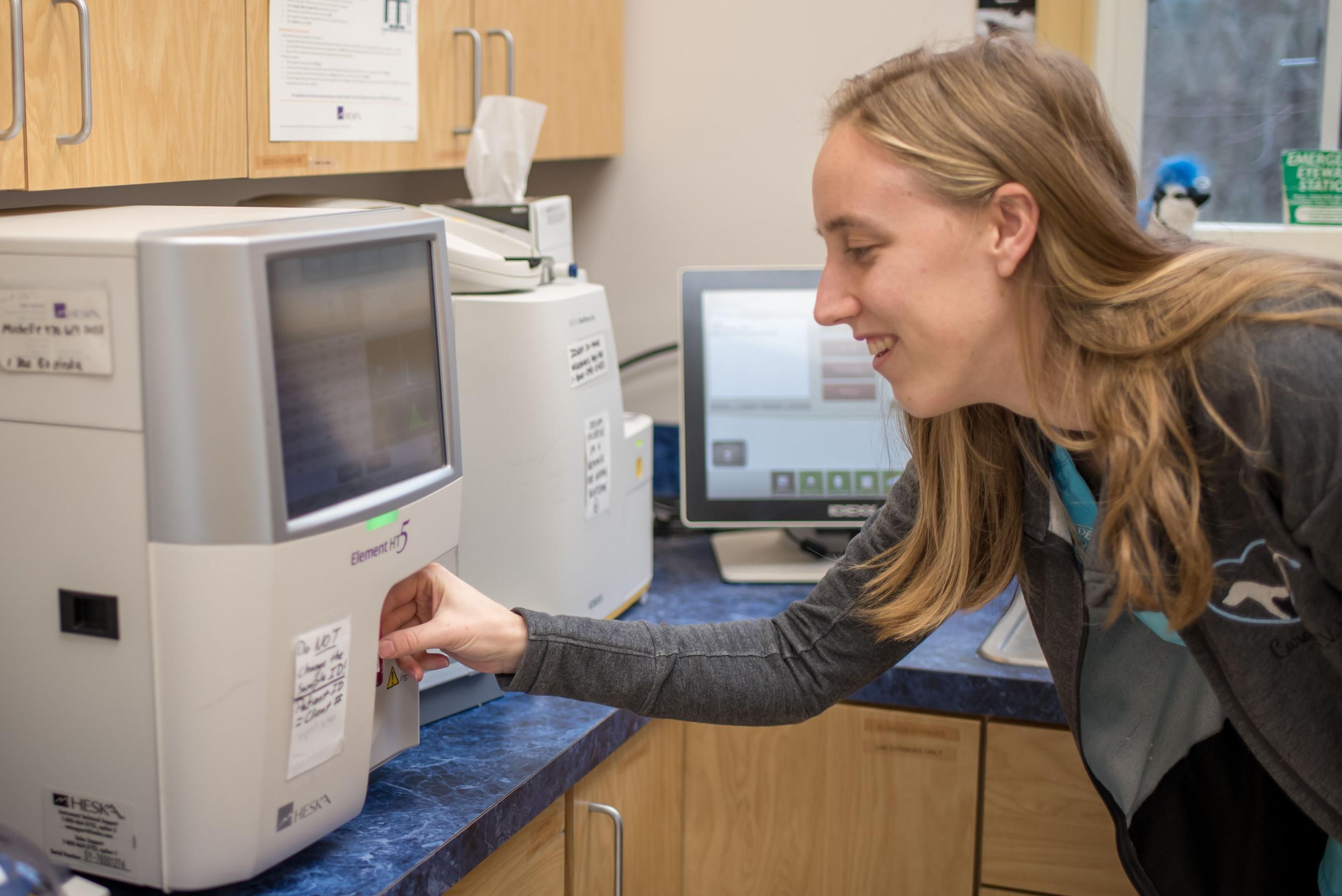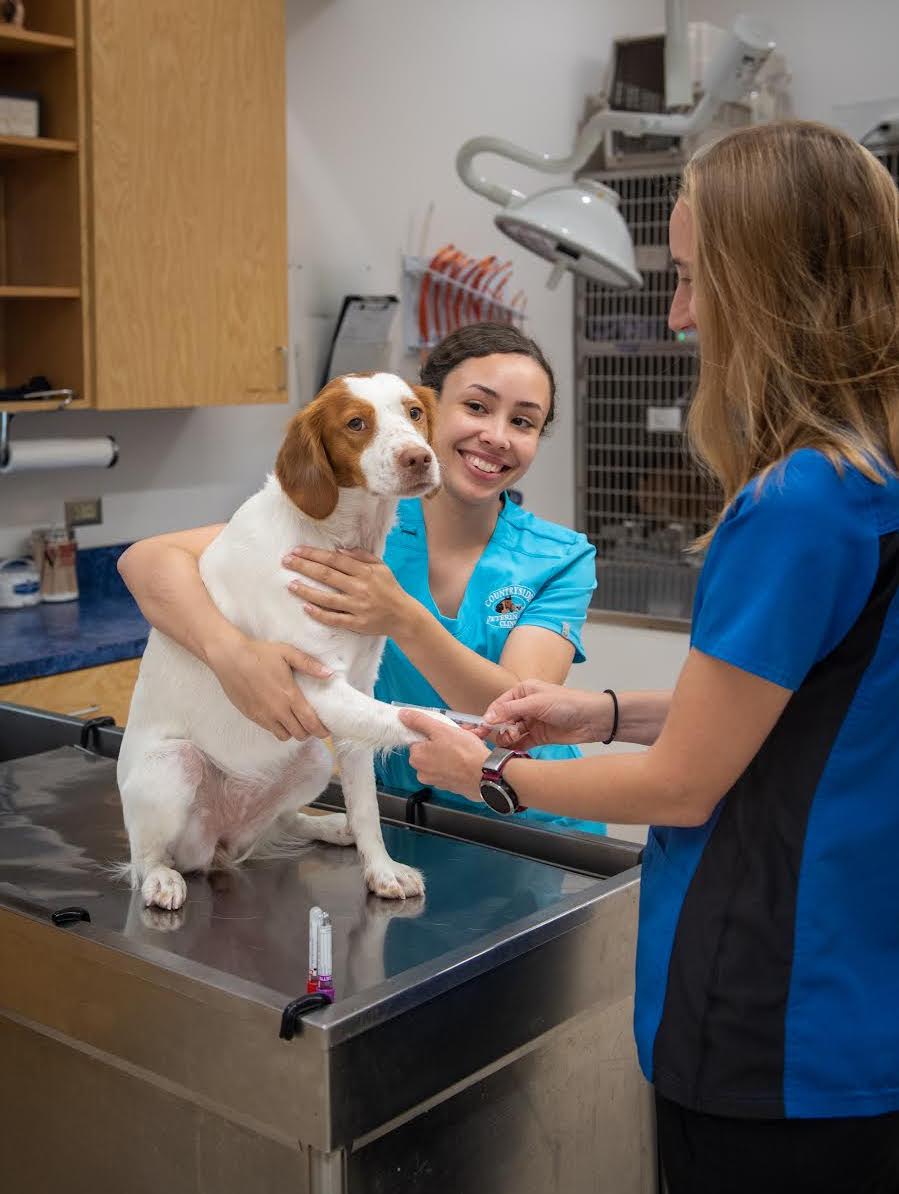How does a baseline lab test benefit the health of my dog?
When you do a baseline or early detection blood work, you're looking at what is normal for that particular dog or cat at that particular time so that if your animal is ill, we already have some normal parameters, and we can determine if it's off.
Dr. Mary Beth Soverns
Countryside Veterinary Clinic
What different types of lab work are there, and how are these tests done?
I break them down into four basic parts. You have fecals, which are stool samples that we send in on dogs. We're generally looking for intestinal parasites. We have blood work where we take blood and send it in for CDCs and chemistries, and we can determine kidney disease, liver disease, anemia, and diabetes. Then we have skin cytology. This lab work is done by taking a slide over the top of a skin lesion or bacterial infection on the skin and putting it under a microscope. The fourth one that I think of is urine samples. Sometimes we collect urine from dogs and put them in our urinalysis machine, and we can have the answers back in moments.
What do the chemistries mean on my dog's blood work?
We say CBCs and chemistries all the time to owners. Let me break it down for you. A CBC is a white blood cell count, a red blood cell count, and a platelet count. A chemistry tells us about kidney function, liver values, blood glucose, total protein, electrolytes, and thyroids. So we can tell you about the health of your pet.
Why might my dog need lab work?
 There are lots of reasons. All day long, we run lab work here. This is a CBC and a chemistry machine, a urinalysis machine. We spin things down, and we can do blood work on here. It's very important for vomiting dogs to see if they're dehydrated. We can tell if they had a toxin. Maybe they're having kidney failure or liver failure. We do it for dogs with weight loss, vomiting, diarrhea, and fevers. We also do it, of course, just to get our normal values. We also use it if they're on medications to ensure they can stay on them. Sometimes we can actually measure the medications. If you're on phenobarbital, we can measure phenobarbital levels and ensure you're on the right dosage.
There are lots of reasons. All day long, we run lab work here. This is a CBC and a chemistry machine, a urinalysis machine. We spin things down, and we can do blood work on here. It's very important for vomiting dogs to see if they're dehydrated. We can tell if they had a toxin. Maybe they're having kidney failure or liver failure. We do it for dogs with weight loss, vomiting, diarrhea, and fevers. We also do it, of course, just to get our normal values. We also use it if they're on medications to ensure they can stay on them. Sometimes we can actually measure the medications. If you're on phenobarbital, we can measure phenobarbital levels and ensure you're on the right dosage.
Why is the early detection and diagnosis of dog illnesses using lab work so important?
The sooner we discover the problem, the more things will happen. The owners will be happy because we have a diagnosis and we have a treatment plan. The animal will be happy because we know what's going on, and we can specifically treat them. The outcome will always be better if you can find it right away and get better. We're going to have better results when you do that.
If you still have other questions and you'd like to reach out to us, you can call us directly at (410) 657-8024, or you can email us at [email protected]. But please do reach out, and we'll get back to you as fast as we can.
Don't forget to follow us on social media on Facebook and Instagram.
Dog Lab Work - FAQs
Dr. Mary Beth Soverns
Countryside Veterinary Clinic
How is blood drawn from my dog?
Come over here, and I'll show you. This is our dog, Oakley, and he is getting blood work done today. You can take it from their neck or leg vein, and Kathy will show you how we do this. We insert it gently through the skin, and we have good lighting. We'll just be patient here for a second. Emma here was holding off the blood vessel, and we will draw just enough. Emma will be a bandaid, and Kathy will put it in our special tubes. Ethan's in charge of feeding Emma a cookie if he is a good boy. Emma will let him sit up here in a minute, and then he can have a cookie.
Is the sample collection painful for my dog?
You saw us, and I think he forgives us for that. I know they're a little bit nervous, but I don't think that was a great deal of pain. It would just be like if we had blood drawn at a hospital visit ourselves.
How is the safety of my dog ensured when getting lab work done?
We're careful about how we put him up here on a table. Emma was holding him securely and giving him a big hug. We have good lighting so that Kathy can see very well. And then, we draw the blood, and we try to feed them during the process so that they're rewarded for their good behavior.
Does my senior dog really need lab work done?
Definitely. Senior animals are more likely to develop diabetes, kidney failure, liver disease, or some other electrolyte problems, like Cushing's disease. So by checking it routinely, we'll be able to catch it right away.
Will my dog need more than one type of lab test?
 Possibly. That was just blood work. That was a CBC and chemistry, maybe a thyroid, but dogs often need fecal checks. They might need a urinalysis to check for diabetes, and it's checking the specific gravity of the urine. They might need cytology of their ears or their skin. So there are lots of types of tests that we do.
Possibly. That was just blood work. That was a CBC and chemistry, maybe a thyroid, but dogs often need fecal checks. They might need a urinalysis to check for diabetes, and it's checking the specific gravity of the urine. They might need cytology of their ears or their skin. So there are lots of types of tests that we do.
Will follow-up lab work need to be done on my dog?
Good question. It depends on two things. Is your dog normal, is it sick, or is it getting better? Second of all, were there any abnormalities in that blood work? If there was, we'd probably want to recheck it after we do the appropriate treatment.
How soon will I receive my dog's lab results?
It's usually very quick. Some of it's done in-house in our laboratory, and we can have it done in minutes. Sometimes we send it out to external laboratories, but it will return in a few days.
